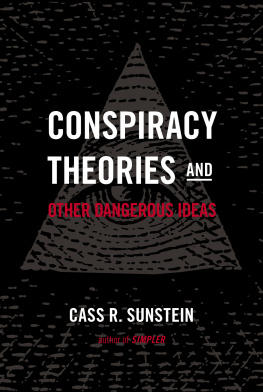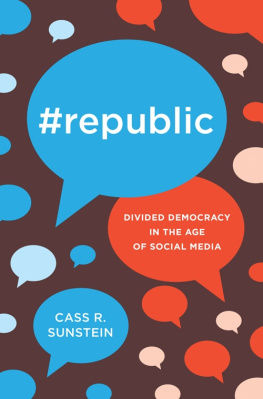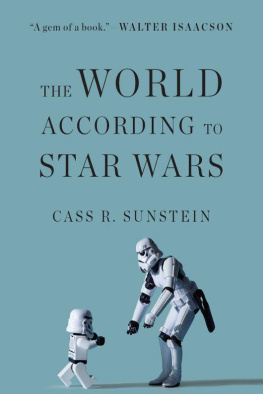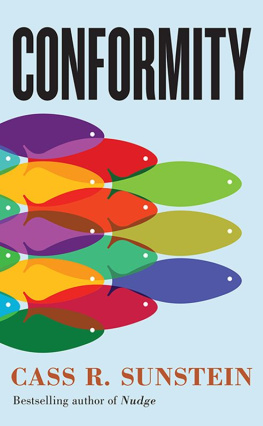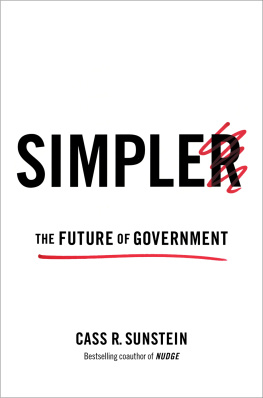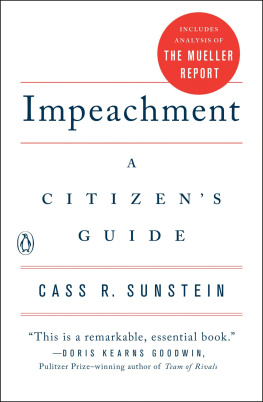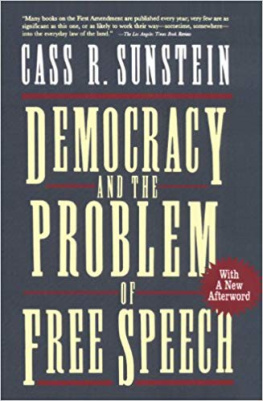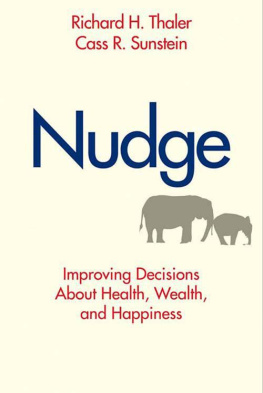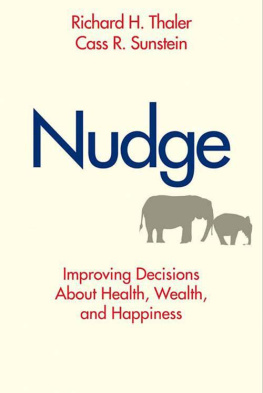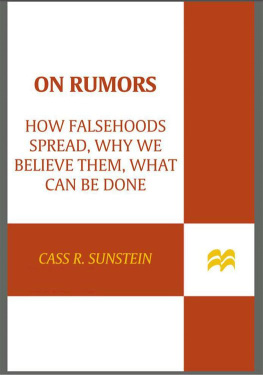Cass R. Sunstein - Why Nudge?
Here you can read online Cass R. Sunstein - Why Nudge? full text of the book (entire story) in english for free. Download pdf and epub, get meaning, cover and reviews about this ebook. year: 2014, genre: Politics. Description of the work, (preface) as well as reviews are available. Best literature library LitArk.com created for fans of good reading and offers a wide selection of genres:
Romance novel
Science fiction
Adventure
Detective
Science
History
Home and family
Prose
Art
Politics
Computer
Non-fiction
Religion
Business
Children
Humor
Choose a favorite category and find really read worthwhile books. Enjoy immersion in the world of imagination, feel the emotions of the characters or learn something new for yourself, make an fascinating discovery.

- Book:Why Nudge?
- Author:
- Genre:
- Year:2014
- Rating:5 / 5
- Favourites:Add to favourites
- Your mark:
- 100
- 1
- 2
- 3
- 4
- 5
Why Nudge?: summary, description and annotation
We offer to read an annotation, description, summary or preface (depends on what the author of the book "Why Nudge?" wrote himself). If you haven't found the necessary information about the book — write in the comments, we will try to find it.
Why Nudge? — read online for free the complete book (whole text) full work
Below is the text of the book, divided by pages. System saving the place of the last page read, allows you to conveniently read the book "Why Nudge?" online for free, without having to search again every time where you left off. Put a bookmark, and you can go to the page where you finished reading at any time.
Font size:
Interval:
Bookmark:
STORRS LECTURES ON JURISPRUDENCE
Yale Law School, 2012
Cass R. Sunstein
The Politics of Libertarian Paternalism

Published with assistance from the foundation established in memory of Amasa Stone Mather of the Class of 1907, Yale College.
Copyright 2014 by Cass R. Sunstein. All rights reserved.
This book may not be reproduced, in whole or in part, including illustrations, in any form (beyond that copying permitted by Sections 107 and 108 of the U.S. Copyright Law and except by reviewers for the public press), without written permission from the publishers.
Yale University Press books may be purchased in quantity for educational, business, or promotional use. For information, please e-mail (U.K. office).
Set in Janson type by Integrated Publishing Solutions.
Printed in the United States of America.
Library of Congress Cataloging-in-Publication Data
Sunstein, Cass R.
Why nudge? : the politics of libertarian paternalism / Cass R. Sunstein.
pages cm.(Storrs lectures on jurisprudence)
Includes bibliographical references and index.
ISBN 978-0-300-19786-0 (hardback)
1. PaternalismPolitical aspectsUnited States. 2. LibertarianismUnited
States. 3. Consumer behaviorPolitical aspectsUnited States. 4. Choice
(Psychology)Economic aspectsUnited States. I. Title.
JC599.U5S94 2014
323.0973dc23
2013035817
A catalogue record for this book is available from the British Library.
This paper meets the requirements of ANSI/NISO Z39.48-1992
(Permanence of Paper).
10 9 8 7 6 5 4 3 2 1
For Eddie Bourke
The only purpose for which power can be rightfully exercised over any member of a civilized community, against his will, is to prevent harm to others. His own good, either physical or moral, is not a sufficient warrant. He cannot rightfully be compelled to do or forbear because it will be better for him to do so, because it will make him happier, because, in the opinion of others, to do so would be wise, or even right.
John Stuart Mill, On Liberty
The central conundrum has been referred to as the Energy Paradox in this setting (and in several others). In short, the problem is that consumers appear not to purchase products that are in their economic self-interest. There are strong theoretical reasons why this might be so:
Consumers might be myopic and hence undervalue the long-term.
Consumers might lack information or a full appreciation of information even when it is presented.
Consumers might be especially averse to the short-term losses associated with the higher prices of energy-efficient products relative to the uncertain future fuel savings, even if the expected present value of those fuel savings exceeds the cost (the behavioral phenomenon of loss aversion).
Even if consumers have relevant knowledge, the benefits of energy-efficient vehicles might not be sufficiently salient to them at the time of purchase, and the lack of salience might lead consumers to neglect an attribute that it would be in their economic interest to consider.
U.S. Environmental Protection Agency,
Final Rule on Light-Duty Vehicle Greenhouse Gas
Emission Standards and Corporate Average
Fuel Economy Standards
INTRODUCTION
Behaviorally Informed Paternalism
ONE
Occasions for Paternalism
TWO
The Paternalists Toolbox
THREE
Paternalism and Welfare
FOUR
Paternalism and Autonomy
FIVE
Soft Paternalism and Its Discontents
EPILOGUE
The Lives We Save May Be Our Own
Why Nudge?
On Wisconsin Avenue in Washington, DC, you can find a restaurant called The Daily Grill, which has created a special set of meals, known as Simply 600, on its lunch and dinner menus. All of those meals have six hundred calories or fewer. If you like, you can order the Chicken Marsala served over Angel Hair Pasta, or the Crab-Stuffed Salmon with Arugula and Grilled Tomato, or (my personal favorite) the Idaho Grilled Trout.
The Simply 600 menu is printed on a separate, highly visible section of the restaurants larger menu. And right outside The Daily Grill, there is a large display featuring the phrase Simply 600 in big characters, with appealing photographs of the various options on the special menu.
Is The Daily Grill being paternalistic? Maybe not. Maybe it is merely catering to what people want, and letting its health-conscious customers know that it has what they are seeking. Maybe it believes that peoples preferences are not static, and maybe it is seeking to alter those preferences in order to attract additional business. But maybe it believes that customers would be better off if they chose healthful, low-calorie meals, and maybe it is hoping to help customers to do exactly that, even if they would not choose such meals without a little help from The Daily Grill.
Suppose that as a matter of fact, the last explanation is the right one. On this account, the restaurant is not forcing anyone to choose anything. If people want high-calorie meals, they can get them, even at The Daily Grill. But the point of the Simply 600 menu is to make healthful choices salient and easyand in that way to nudge consumers not merely to decide to have their meal at The Daily Grill, but also to make those very choices. If so, we appear to be dealing with a case of paternalism.
To be sure, the paternalism is mild, and it is not coming from the government. But if it is paternalistic, is it really objectionable as such? Would things be different, or worse, if governments adopted Simply 600 menus at their own cafeterias? Are things different, or worse, if government seeks to promote more healthful eating by requiring menus to contain calorie information, as indeed the Affordable Care Act does for chain restaurants and similar retail food establishments? What if the government embarks on an aggressive, even graphic educational campaign designed to promote healthful eatingor taxes unhealthful foods, as France, Finland, Denmark, Britain, Hungary, Ireland, and Romania have either done or seriously considered?
Paternalism stirs strong emotions. Many people abhor it. They think that human beings should be able to go their own way, even if they end up in a ditch. When they run risks, even foolish ones, it isnt anybodys business if they do. People have a right to be foolish. Paternalism is especially unwelcome if it comes from government. What gives public officials the right to interfere with the self-regarding decisions of adults, whether the subject is health, wealth, sex, or religion?
However controversial it was in the nineteenth century, the central argument of John Stuart Mills On Liberty has numerous followers in the twenty-first. In his great and inspiring essay, Mill insisted that as a rule, government may not legitimately coerce people if its goal is to protect them from themselves. In a defining passage, Mill contended that
the only purpose for which power may be rightfully exercised over any member of a civilized community, against his will, is to prevent harm to others. His own good, either physical or mental, is not a sufficient warrant. He cannot rightfully be compelled to do or forbear because it will be better for him to do so, because it will
This, then, is Mills Harm Principle (sometimes called the Liberty Principle). Unless there is harm to others, the government cannot exercise power over people. The idea of consumer sovereignty, central to modern economics and much political debate, is a close cousin to the Harm Principle. Even if Mills own concerns seem to revolve around morals legislation, we should be able to see immediately that the Harm Principle raises serious doubts about many laws and regulations, including those that require people to get a prescription before obtaining certain medicines, forbid employees from working in unsafe workplaces (even if they would voluntarily run those risks), and promote food safety. In all of these cases, power is exercised over people in large part to promote their own good. When the resulting requirements are in place, people are not entirely sovereign over their own bodies and minds.
Next pageFont size:
Interval:
Bookmark:
Similar books «Why Nudge?»
Look at similar books to Why Nudge?. We have selected literature similar in name and meaning in the hope of providing readers with more options to find new, interesting, not yet read works.
Discussion, reviews of the book Why Nudge? and just readers' own opinions. Leave your comments, write what you think about the work, its meaning or the main characters. Specify what exactly you liked and what you didn't like, and why you think so.

